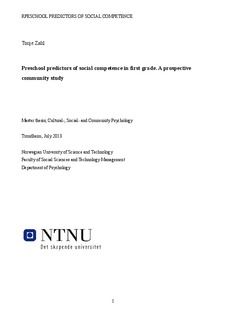| dc.description.abstract | Background: Developing a well-adept social competence in preschool years is considered important and seems to play a pivotal role in later social functioning like school readiness and academic competence. Due to the individual development in children, establishing potential early markers of early social problems has been difficult. Although parent, peer, and contextual factors may be important to children’s development of social competence, the present study addressed the range of individual differences in children that may facilitate or impede social skills development.
Method: The paper is based on data from the comprehensive longitudinal Trondheim Early Secure Study (TESS) of a screen-stratified community sample of 2475 children who were assessed at 4 year of age (T1) and followed up at the age of 6 (T2) (n=797). General linear modeling weighting data back to yield true population estimates of the predictive value of Social Competence, Gender, Negative Affectivity, Surgency, Effortful Control, Inattention, Hyperactivity, Impulsivity, Peer Problems, Disorganized Attachment and Callous-Unemotional traits assessed at T1 in predicting Social Competence at T2, when adjusting for Social Competence at T1.
Results: Analysis indicates that Social Competence, Surgency, Inattention, Peer Problems high levels of Callous-Unemotional traits and Disorganization were unique predictors of Social Competence when adjusting for all variables. Negative Affectivity failed to predict Social Competence.
Conclusions: Beyond a sizable continuity in social competence a range of child characteristics may enhance social skills development in young children . The identification of such child factors, when controlling for other potential factors, may inform health promotion efforts towards increasing young children’s social competence. | nb_NO |
